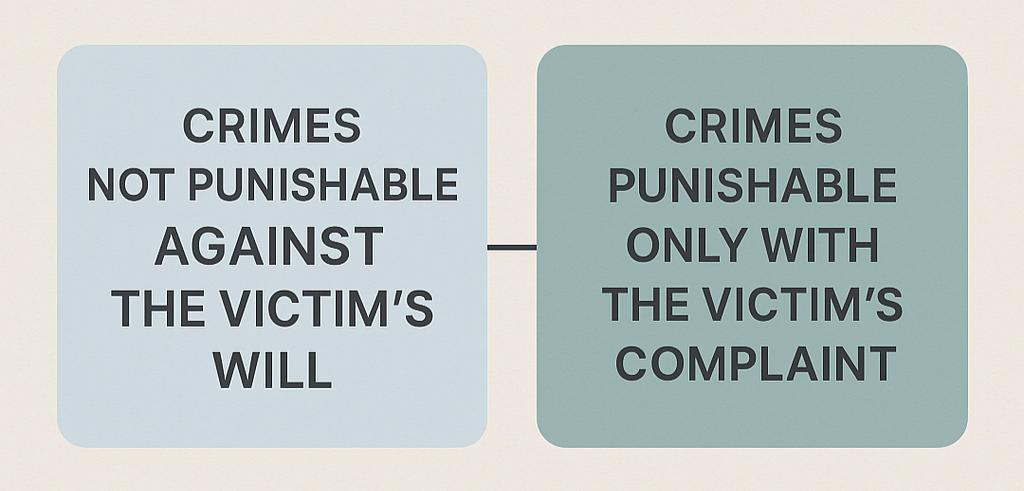Foreigners in Korea often face unfamiliar legal terms in criminal cases, including “crimes not punishable against the victim’s will” (반의사불벌죄) and “crimes punishable only with the victim’s complaint” (친고죄). These concepts are important in Korean criminal law because they directly affect how cases begin, whether the authorities can continue an investigation, and how settlements influence the outcome. This article, written by an English speaking lawyer in Korea who supports foreigners, explains these rules to help expats better understand and navigate the Korean legal system.
1. Crimes Not Punishable Against the Victim’s Will (반의사불벌죄)
These are crimes where prosecutors can begin a case without the victim’s initial complaint, but if the victim later states that they do not want the offender punished, the prosecution must close the case.
Common Examples
For a crime to fall into this category, it must be explicitly provided for in the law. Common examples include assault, intimidation/threat, and defamation.
Important Note: The crime of stalking was revised and is no longer classified as a crime not punishable against the victim’s will. A stronger defense strategy is now required, and up-to-date legal advice is essential.
How It Works
Police or prosecutors can begin an investigation without the victim’s complaint. However, if the victim submits a “statement of non-punishment,” the case must be closed. Timing is key: the victim must submit this statement before the first-instance trial is finalized.
2. Crimes Punishable Only with the Victim’s Complaint (친고죄)
These are crimes where the legal process cannot begin without a complaint from the victim. Without such a complaint, investigation authorities cannot initiate or continue the case.
Common Examples
For a crime to fall into this category, it must also be explicitly provided for in the law. Common examples include the crime of insult, defamation of dead person, and violation of secrecy.
Note: Legislative reforms have reduced the number of these crimes in recent years, especially in sexual offense laws, so updated legal advice is crucial.
How It Works
A victim (or a person to file a complaint) must file a criminal complaint. There is a strict deadline: the complaint must be filed within six months of the victim identifying the offender. If this deadline passes, the right to file a criminal complaint is lost and prosecution becomes permanently barred.

3. The Core Difference
Who can start the case?
In the case of “crimes not punishable against the victim’s will” (e.g., crime of assault) the prosecutor can begin an investigation and prosecution even without the victim filing a complaint. By contrast, for “crimes punishable only with the victim’s complaint” (e.g., crime of insult), the case cannot begin unless the victim actively files a formal complaint with the authorities.
Who can stop the punishment?
For “crimes not punishable against the victim’s will,” the victim may stop the case at any time before the first-instance judgment by submitting a statement that they do not wish the offender to be punished. Similarly, for “crimes punishable only with the victim’s complaint,” the complainant also has the right to withdraw the complaint before the judgment at the first instance trial. Once the complaint is withdrawn, the prosecution can no longer continue with the case.
Therefore, the core difference is that for “crimes punishable only with the victim’s complaint,” the filing of the complaint is a prerequisite for starting the case, while for “crimes not punishable against the victim’s will,” the case can begin without the victim’s initial complaint, but the victim can also end it.
4. Why This Matters for Foreigners in Korea
If you are a victim, understanding these rules helps you recognize your leverage. Do you need to file a formal complaint to get things started, or do you have the power to stop a case that has already begun.
If you are the accused, and you are not contesting the alleged acts, negotiating a settlement with the victim may be the most effective way to achieve dismissal. Misunderstanding these procedures could lead to a criminal record that might otherwise have been avoided.
5. Conclusion
The distinction between “crimes not punishable against victim’s will” and “crimes punishable only with victim’s complaint” is a cornerstone of Korean criminal procedure. Both highlight the victim’s influence, but in different ways. If you are facing a situation involving either category, it is strongly recommended to consult with an experienced Kang & Shin Law Firm in Korea to ensure your rights are fully protected.

